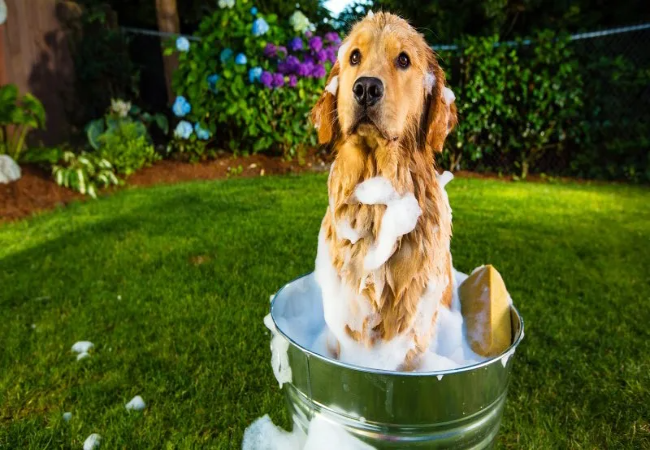Vet Guide to 2025: Why Your Dog Smells & How to Fix It — Causes, Solutions & Grooming Tips 🐶🩺

In this article
Vet Guide to 2025: Why Your Dog Smells & How to Fix It — Causes, Solutions & Grooming Tips 🐶🩺
By Dr. Duncan Houston BVSc
Foul odors from your dog can be embarrassing—and sometimes serious. I’m Dr Duncan Houston BVSc, here to guide you through diagnosing and treating your dog’s smell, with easy home care, grooming tools, and vet support via Ask A Vet,✨
1. Normal vs Problematic Smells
A mild “doggy” scent is normal—but strong, persistent or unpleasant odors (like fishy, yeasty or sewage-like) signal underlying issues that need care.
If a warm bath doesn’t help, and odor comes from ears, skin, mouth or rear, it’s time to investigate further.
2. Common Causes of Odor
🐾 Skin & Coat Infections (Yeast & Bacteria)
Yeast and bacterial overload thrive on irritated skin—caused by allergies, moisture, hormones or folds—producing a “corn chip,” cheesy, or musty odor. Your dog’s paws, groin, underarms or facial folds are common hotspots.
👂 Ear Infections
Otitis—yeast or bacterial—produces a strong odor often like wet socks or sewage. Dogs with floppy ears or allergies are more prone.
🦷 Dental Disease (Halitosis)
Poor oral hygiene leads to infected gums, tartar and bacterial overgrowth—often described as “fishy” or metallic breath.
💨 Gas & Digestive Issues
Your dog’s diet affects their smell—even flatulence can be overpowering. Sudden changes or GI issues like IBD might also contribute to body odor.
🐟 Anal Gland Problems
Full, impacted, or infected anal sacs release a fish-like odor—especially if ingested, leading to scooting or licking around the rear.
🎯 Other Causes
- Rolling in stinky substances (decay, skunk etc.)—needs specialized washes.
- Systemic issues like kidney or liver disease may cause ammonia or sweet breath—always consult your vet.
3. Quick Home Remedies
- ➡️ Bath with medicated shampoo: Use antifungal or antibacterial products; dry folds thoroughly. Wipe regularly between baths.
- ➡️ Clean ears: Use vet-approved cleaner—avoid chemical drops unless advised.
- ➡️ Brush teeth daily: Use canine toothpaste; offer dental chews to reduce plaque.
- ➡️ Express anal sacs—or have your vet/groomer do it every 1–3 months.
- ➡️ Improve diet: High-quality protein, limited carbs, added fiber and probiotics reduce odor-causing allergies & gut issues.
4. When to See a Vet
If odor persists despite grooming, or is accompanied by:
- ☑️ Persistent itching, redness or skin lesions
- ☑️ Ear scratching, shaking, discharge
- ☑️ Bad breath with tooth decay, drooling or reluctance to eat
- ☑️ Scooting, swelling or discomfort near the anus
- ☑️ Lethargy, vomiting, change in drinking or bathroom habits
Your vet will examine, perform diagnostics (skin swabs, ear cytology, dental exam, blood work) and suggest meds, special shampoos, dental cleaning or dietary change.
5. Ask A Vet,
- 📱 Ask A Vet – Send pics/videos of odor areas; get professional advice on whether it’s serious, and treatment plans.
6. Avoiding Recurrence
- 🔁 Schedule grooming every 4–8 weeks, depending on breed and coat type.
- 🧼 Clean ears weekly in dogs prone to infections.
- 🪥 Maintain a regular tooth-brushing habit.
- 📋 Keep a diary—note odor triggers, treatments, vet visits.
- 🍽️ Adjust diet with vet or Ask A Vet’s input—especially for allergies or GI issues.
7. FAQs
- Q: Baths made no difference—what now?
- If odor persists after medicated baths, it may be a medical condition—ear, skin, dental, or anal gland related—so consult Ask A Vet or your veterinarian.
- Q: My dog farts constantly—could that be making them stink?
- Yes—diet changes, slow feeding bowls, or added fiber can help. Persistent flatulence may require vet evaluation for GI health.
- Q: Are natural deodorizing sprays safe?
- Yes—if vet-approved and alcohol-free. However, sprays mask odors; treat the root cause instead.
Conclusion 💡
While all dogs have a natural scent, strong or unusual odors usually signal an underlying health concern. By following a regular care routine—baths, ear & dental cleaning, grooming and diet—backed by expert advice from Ask A Vet, you can restore a fresh, healthy pet and home. Here's to a fresher future together! 🐾❤️






